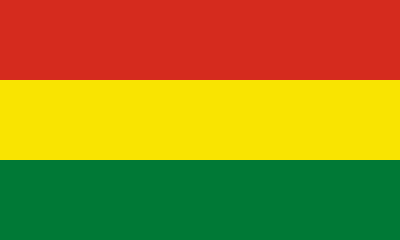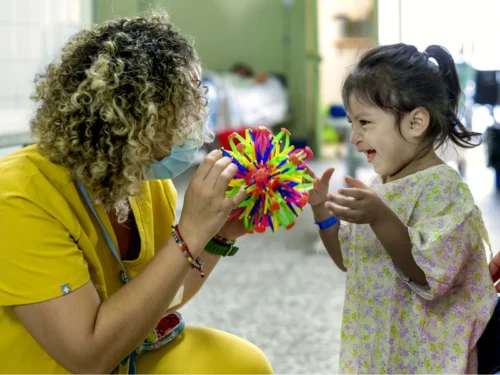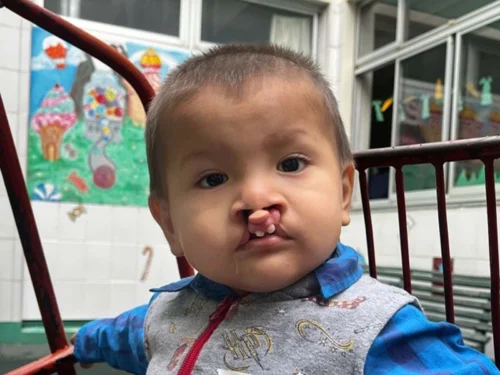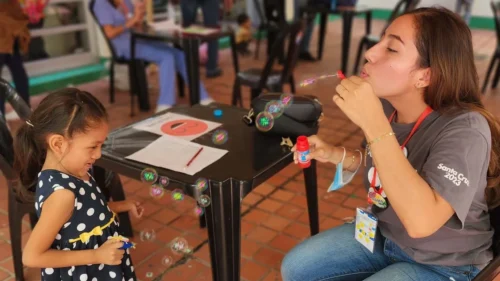
Operation Smile Bolivia has delivered around 4,880 surgeries and built a strong network of around 170 Bolivian volunteers across various specialties.

THE NEED
One in 350-500 births. Bolivia has the highest reported prevalence of cleft cases in the world. In some regions, one in 350-500 babies is born with a cleft condition. Operation Smile’s survey revealed that 95% of patients arriving at Operation Smile programs in Bolivia could not have undergone surgery without the support of Operation Smile.
Shortage of health workforce for cleft-affected patients. The burden of cleft disease is amplified by the fact that Bolivia has just 34 specialized surgical workers per 100,000 people. In high-income countries, the rate stands at 71 specialized surgical workers.
Financial burden. Considering that 57% of patients arriving at Operation Smile programs in Bolivia live below the poverty line and 63% have no health insurance, many are vulnerable to out-of-pocket payments. This situation leaves 11% of Bolivians at risk of impoverishing expenditure for surgical care. Additionally, 8% of the population faces catastrophic expenditure for surgical care.
Limited surgical capacity. The Lancet Commission on Global Surgery proposed that countries should perform 5,000 surgical procedures per 100,000 people. Bolivia achieves just 2,305 procedures per 100,000 people, leaving behind many people born with cleft lip and cleft palate. 33% of patients arriving at Operation Smile programs do not have a hospital within two hours of their home. The Lancet Commission suggests that at least 80% of the population should live within two hours of a hospital.
Barriers to education and employment. In Bolivia, 30% of patients arriving at Operation Smile programs said that their condition limited their school attendance, while 31% said that their school performance is impacted by their condition. 27% of caretakers we surveyed stay home to care for their children.
OUR FORMULA FOR TRANSFORMATION
Operation Smile’s formula for transformational impact combines surgical and non-surgical care delivery and capacity-building.
Education and training programs are at the center of Operation Smile’s strategy to increase access to surgery closer to the patient’s home.
Each surgical program brings together providers from all over the world for a unique opportunity to share knowledge and innovate. This type of bi-directional learning is essential to redistributing knowledge between providers and building capacity in the areas of greatest need.
Our work in health infrastructure addresses structural barriers to care and helps build robust health systems. Operation Smile’s research & innovation efforts inform all aspects of our decision-making and allow us to have a comprehensive understanding of the impact our programs have on patients.
HUBS & SPOKES
To ensure that every child has access to care closer to home, we equip the providers within our patients’ communities with skills and resources to deliver high-quality care.
In Bolivia, Operation Smile provides care at Hospital Japones, our hub in Santa Cruz.
We are currently building teams at spokes in Cochabamba and La Paz and will launch surgical care at both sites within the year. Operation Smile is also working to establish an additional spoke in Santa Cruz at Hospital Del Niño.


During Fiscal Year July 2024-June 2025, Operation Smile Canada has committed to invest $776,011 CAD, accounting for 67% of Bolivia’s total projected budget for the fiscal year, which will directly contribute to providing high-quality surgery and care for 410 patients and deliver training to 200 medical providers.
Cleft Care Programs
This year, Operation Smile in Bolivia will deliver surgery to around 410 patients. We will expand comprehensive care by providing consultations in oral health (1,070 patients), nutrition (440 patients), psychosocial care (350 patients), pediatrics (390 patients) and speech therapy (1,000 patients). Operation Smile will recruit just under 2,000 new patients in need of cleft treatments.
Education
Operation Smile will provide training and education for approximately 200 medical providers across various specialties, including surgery, anesthesia, plastic surgery, nursing, pediatrics, biomedical technology, oral health, psychology, speech therapy and post-anesthesia care. We will conduct training during short-term surgical programs and Champion programs, at hospital-based partners and during conferences and workshops. We will work under a new agreement with Universidad Privada Alberta Latinoamericana to train dental students, enabling them to provide oral health services in Cochabamba. Our next goal is to cultivate a partnership with University UNIFRANZ to expand training opportunities in the field of oral health.








